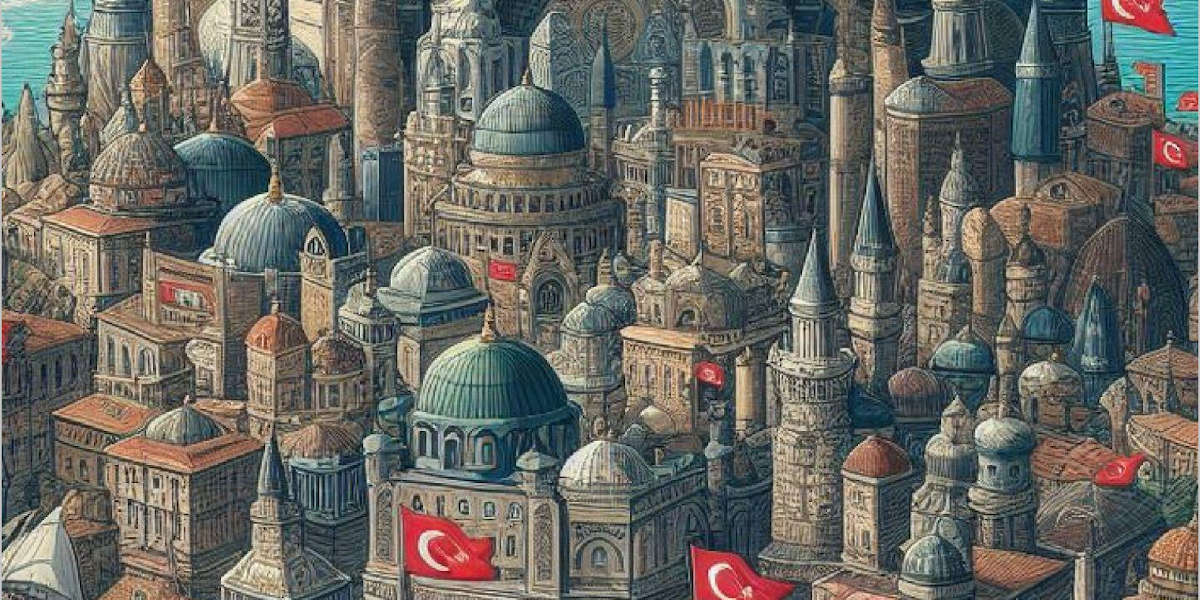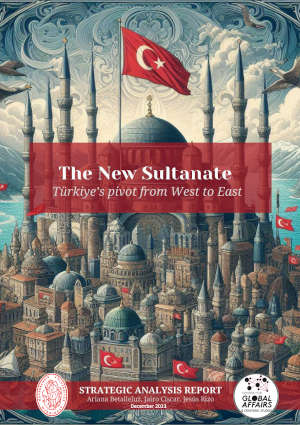In the image
An imagined Turkish city, created with an AI program by the authors
EXECUTIVE SUMMARY
President Erdoğan’s Islamism has come to stay. Although bridging Europe and Asia through the Bosporus, Türkiye’s near future will revolve around the latter and, in particular, around the Middle East.
In regards to its neighboring European countries, territorial disputes with Greece and Cyprus will still be present, although no open war can be expected. Türkiye will keep claiming its sovereign and energy rights against both countries, erecting itself as the guardian of Turkic-Muslim populations and interests. From the EU perspective, this would make the Turkish accession process unresolvable in this report’s time frame. From Türkiye’s point of view, although potential accession presents positive and negative connotations, the latter are more determining, making accession not a priority for Turkish society and politicians. Belonging to NATO, however, is essential for Türkiye’s security in its troubled region, just as it provides the Atlantic Alliance a privileged position in the Middle East, increasing their synergies and interrelation and making Turkish exit almost impossible. At the same time, Türkiye will increase its economic, cultural and diplomatic presence in the Western Balkans, fostering its development and regional integration.
The same will happen in the Middle East. Türkiye has historically played a pivotal role there, being a region with immense geostrategic significance due to its energy resources, political conflicts, and cultural diversity. Over the past few decades, Türkiye’s role in the Middle East has evolved and expanded, as the nation sought to be a dynamic and influential player in the region. A main approach for Turkish involvement in the region is through diplomatic initiatives aimed at resolving regional conflicts, but often being sustained involving deployment of troops, such as in Syria. Regarding Central Asia, a Turkic-majority region, Türkiye will also foster its presence through economic and cultural projects, allying with global powers with interests in the region like U.S. To do so, Türkiye will need to use all the relevant tools at its disposition, from armed interventions to diplomatic summits. Iran is on the horizon as Türkiye’s main competitor in the region, but they will need to balance their ambitions as per not to clash with increasingly consolidated players in the region, such as China. Türkiye is afronting key decades for the future of their global positioning, and the Middle East will be key for that.
This power projection will be further advanced, first, through its transformation into an energy hub between energy-surplus countries in the South Caucasus, the Middle East, and Central Asia; and energy-deficient countries in Europe. Türkiye will continue to decouple from Russia in terms of energy dependence, by diversifying its supply. It will also progressively acquire more relevance in global energy dynamics because of its dominance over transport pipelines that lie across the Turkish territory. Secondly, Türkiye’s involvement in ongoing regional conflicts as either a mediator or competitor, depending on its own strategic calculus and security priorities, will strengthen its already relevant role in regional geopolitics. Importantly, the management of the Kurdish question will fundamentally determine Türkiye’s near future and aspirations of becoming a medium regional power in the medium to long term. Among all plausible scenarios in this regard, a campaign of multidimensional repression that fosters Turkish regional power appears as the most likely.


